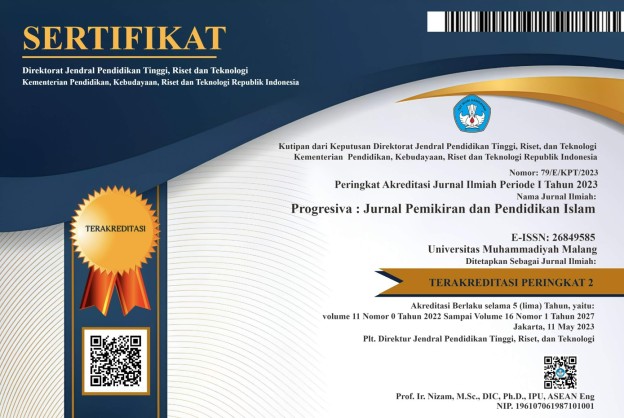The Utilization of Information Technology for the Professional Development of Islamic Education Teachers in Indonesia
DOI:
https://doi.org/10.22219/progresiva.v12i02.31169Keywords:
Technology, Professional Development, Islamic Religious Education, Teachers, IndonesiaAbstract
The professional development of Islamic Religious Education (PAI) teachers is crucial to enhancing the quality of PAI learning in schools. One effective means to support their professional growth is through the utilization of technology as a learning medium and information source. This article aims to explore the use of technology by PAI teachers in their professional development, focusing on three key aspects: (1) The Importance of Integrating Technology in Teacher Professionalism; (2) Types and Functions of Technology Used by PAI Teachers; (3) Challenges Encountered by PAI Teachers in Advancing Professionalism through Technology. The research methodology used the qualitative method with the literature review approach, encompassing data collection and analysis from diverse sources such as journals, books, reports, and websites. The findings reveal that PAI teachers in Indonesia employ various technologies, including computers, laptops, smartphones, tablets, internet connectivity, social media platforms, applications, and software, for multiple purposes like information retrieval, communication, collaboration, content creation, presentation, and assessment of learning. The use of technology among PAI teachers yields several advantages, including the enhancement of knowledge, skills, motivation, creativity, networking opportunities, and learning resources. However, they face challenges related to limited infrastructure, access, costs, and support. Moreover, there's a lack of readiness, competence, and awareness regarding ethics and security among these educators. PAI teachers encounter difficulties, obstacles, and risks such as network disruptions, viruses, malware, spam, phishing, hacking, cyberbullying, and plagiarism. The challenges of utilizing technology for teacher professional development encompass skills, attitudes, infrastructure, and ethical considerations. Therefore, PAI teachers must possess adequate competence and readiness to integrate technology into their professional development.
Downloads
References
Al-Zyoud, H. M. M. (2020). The role of artificial intelligence in teacher professional development. Universal Journal of Educational Research, 8(11B). https://doi.org/10.13189/ujer.2020.082265
Angus Cole, K. (2021). Education Brief: Teacher professional development Teacher. Cambridge Assessment International Education, 5.
Beardsley, M., Albó, L., Aragón, P., & Hernández-Leo, D. (2021). Emergency education effects on teacher abilities and motivation to use digital technologies. British Journal of Educational Technology, 52(4), 1455–1477. https://doi.org/10.1111/bjet.13101
Beisiegel, M., Mitchell, R., & Hill, H. C. (2018). The design of video-based professional development: An exploratory experiment intended to identify effective features. Journal of Teacher Education, 69(1), 69–89. https://doi.org/10.1177/0022487117705096
Chen, G., Chan, C. K. K., Chan, K. K. H., Clarke, S. N., & Resnick, L. B. (2020). Efficacy of video-based teacher professional development for increasing classroom discourse and student learning. Journal of the Learning Sciences, 642–680. https://doi.org/10.1080/10508406.2020.1783269
Engkizar, E., Muliati, I., Rahman, R., & Alfurqan, A. (2018). The Importance of Integrating ICT Into Islamic Study Teaching and Learning Process. Khalifa: Journal of Islamic Education, 1(2). https://doi.org/10.24036/kjie.v1i2.11
Fernández-Batanero, J. M., Montenegro-Rueda, M., Fernández-Cerero, J., & García-Martínez, I. (2022). Digital competences for teacher professional development. Systematic review. European Journal of Teacher Education, 45(4), 513–531. https://doi.org/10.1080/02619768.2020.1827389
Fiantika, F. R. (2022). Metodologi Penelitian Kualitatif (Issue March). PT. Global Eksekutif Teknologi.
Gerard, L., Kidron, A., & Linn, M. C. (2019). Guiding collaborative revision of science explanations. International Journal of Computer-Supported Collaborative Learning, 14(3), 291–324. https://doi.org/10.1007/s11412-019-09298-y
Huang, R., Spector, J. M., & Yang, J. (2019). Lecture Notes in Educational Technology Educational Technology A Primer for the 21st Century. Springer Nature Singapore .
Imants, J., & Van der Wal, M. M. (2020). A model of teacher agency in professional development and school reform. Journal of Curriculum Studies, 52(1), 1–14. https://doi.org/10.1080/00220272.2019.1604809
Jennings, P. A., Doyle, S., Oh, Y., Rasheed, D., Frank, J. L., & Brown, J. L. (2019). Long-term impacts of the CARE program on teachers’ self-reported social and emotional competence and well-being. Journal of School Psychology, 76, 186–202. https://doi.org/10.1016/j.jsp.2019.07.009
Jones, W. M. (2021). Teachers’ perceptions of a maker-centered professional development experience: a multiple case study. International Journal of Technology and Design Education, 31(4), 697–721. https://doi.org/10.1007/s10798-020-09581-2
Jujur, I. W. (2023). Upaya Meningkatkan Kinerja Dan Kompetensi Pedagogik Guru Dalam Mengajar Menggunakan Media Pembelajaran. Jurnal Nalar : Pendidikan Dan Pembelajaran, 1(2), 77–85. https://doi.org/10.52232/jnalar.v1i2.9
Kasman, A., Ikhwan, M., & Aziz, D. (2022). Islamic Education as a Strengthening of Aqidah and Akhlaq in The Society 5.0 Era. Cendekia: Jurnal Kependidikan Dan Kemasyarakatan, 20(2), 181–189. https://doi.org/10.21154/cendekia.v20i2.4962
Laurillard, D., Kennedy, E., Charlton, P., Wild, J., & Dimakopoulos, D. (2018). Using technology to develop teachers as designers of TEL: Evaluating the learning designer. British Journal of Educational Technology, 49(6), 1044–1058. https://doi.org/10.1111/bjet.12697
Lie, A., Tamah, S. M., Gozali, I., Triwidayati, K. R., Utami, T. S. D., & Jemadi, F. (2020). Secondary School Language Teachers’ Online Learning Engagement During the Covid-19 Pandemic in Indonesia. Journal of Information Technology Education: Research, 19, 803–832. https://doi.org/10.28945/4626
Makovec, D. (2018). The teacher’s role and professional development. International Journal of Cognitive Research in Science, Engineering and Education, 6(2), 33–45. https://doi.org/10.5937/ijcrsee1802033M
Mansir, F. (2022). The Position of Islamic Education According to the National Educational System in Indonesia. Progresiva : Jurnal Pemikiran Dan Pendidikan Islam, 11(01). https://doi.org/10.22219/progresiva.v11i01.20416
Marisana, D., Iskandar, S., & Kurniawan, D. T. (2023). Penggunaan Platform Merdeka Mengajar untuk Meningkatkan Kompetensi Guru di Sekolah Dasar. Jurnal Basicedu, 7(1), 139–150. https://doi.org/10.31004/basicedu.v7i1.4363
Masdoki, M., Din, R., & Mohd. Matore, M. E. @ E. (2021). Teaching 4.0 Competency in Higher Learning Institutions: A Systematic Mapping Review. International Journal of Learning, Teaching and Educational Research, 20(10), 217–231. https://doi.org/10.26803/ijlter.20.10.12
Miles, M. B., Huberman, A. M., & Saldana, J. (2019). Qualitative Data Analysis A Methods Sourcebook (Fourt Edit). SAGE Publications.
Moleong, L. J. (2018). Metodologi penelitian Kualitatif. PT Remaja Rosdakarya.
Mustofa, -. (2012). Upaya Pengembangan Profesionalisme Guru di Indonesia. Jurnal Ekonomi Dan Pendidikan, 4(1). https://doi.org/10.21831/jep.v4i1.619
Muzakki, Z. (2022). Formation of student character in islamic religious education. EDUKASIA: Jurnal Pendidikan Dan Pembelajaran.
Nawab, A., Bissaker, K., & Datoo, A. K. (2021). Contemporary trends in professional development of teachers: importance of recognising the context. International Journal of Educational Management, 35(6), 1176–1190. https://doi.org/10.1108/IJEM-10-2020-0476
Nuryana, Z. (2019). Pemanfaatan Teknologi Informasi dalam Pendidikan Agama Islam. Tamaddun, 19(1), 75. https://doi.org/10.30587/tamaddun.v0i0.818
Pelangi, G. (2020). Pemanfaatan Aplikasi Canva Sebagai Media Pembelajaran Bahasa Dan Sastra Indonesia Jenjang SMA/MA. Jurnal Sasindo Unpam, 8(2), 1–18.
Putri Husma, M. J., Shaleh, S., & Handayani, T. (2023). Profil Guru Profesional di Era Industri 5.0. Al-Madrasah: Jurnal Pendidikan Madrasah Ibtidaiyah, 7(2), 672. https://doi.org/10.35931/am.v7i2.2053
Rahman, A. (2016). Islamic Education in the Era of Technological Wave: A Case in Indonesia Today. Proceeding of International Conference on Islamic Education, 1–8. https://doi.org/10.51425/icie.vi.14
Romanova, G., Petrenko, L., Romanov, L., Kupriyevych, V., & Antoniuk, L. (2022). Digital Technologies As A Driver of Professional Development of Teachers of Vocational Education Establishments. Youth Voice Journal, 4(SpecialIIssue).
S, M. T., & Riadi, A. (2020). Implikasi Paedagogis Alquran Surat Luqman Ayat 13-19 Tentang Materi Dasar Pendidikan Agama Islam. Jurnal Penelitian, 14(2), 347. https://doi.org/10.21043/jp.v14i2.8139
Schaaf, D. N. (2018). Assistive Technology Instruction in Teacher Professional Development. Journal of Special Education Technology, 33(3), 171–181. https://doi.org/10.1177/0162643417753561
Snyder, H. (2019). Literature review as a research methodology: An overview and guidelines. Journal of Business Research, 104, 333–339. https://doi.org/10.1016/j.jbusres.2019.07.039
Thoifah, I., & Biantoro, S. (2021). Problems and Alternative Solutions for the Implementation of Islamic Education Learning during the Pandemic: A Literature Review. Progresiva : Jurnal Pemikiran Dan Pendidikan Islam. https://doi.org/10.22219/progresiva.v10i1.17693
Tuna, M. H. (2022). The professionalisation of Islamic religious education teachers. British Journal of Religious Education, 44(2), 188–199. https://doi.org/10.1080/01416200.2021.1999905
Van Mieghem, A., Verschueren, K., Petry, K., & Struyf, E. (2020). An analysis of research on inclusive education: a systematic search and meta review. In International Journal of Inclusive Education (Vol. 24, Issue 6, pp. 675–689). https://doi.org/10.1080/13603116.2018.1482012
Warsita, B.-. (2019). Pemanfaatan Portal Rumah Belajar Untuk Meningkatkan Kualitas Pembelajaran. Jurnal Teknodik, 31(1), 65–78. https://doi.org/10.32550/teknodik.v0i0.355
Willems, I., & Van den Bossche, P. (2019). Lesson Study effectiveness for teachers’ professional learning: a best evidence synthesis. In International Journal for Lesson and Learning Studies (Vol. 8, Issue 4, pp. 257–271). https://doi.org/10.1108/IJLLS-04-2019-0031
Wright, D. B. (2019). Research Methods for Education With Technology: Four Concerns, Examples, and Recommendations. Frontiers in Education, 4. https://doi.org/10.3389/feduc.2019.00147
Yahya, A. (2022). Pemanfaatan Teknologi Informasi Dalam Pendidikan Agama Islam. Jurnal Teknologi Dan Bisnis, 4(2), 155–162. https://doi.org/10.37087/jtb.v4i2.105
Zubairi, Z., & Nurdin, N. (2022). The Challenges of Islamic Religious Education in the Industrial Revolution 4.0. Scaffolding: Jurnal Pendidikan Dan Multikultural, 4(3).
Zuhaida, A. (2019). Integrative Scientific Madrasah in Indonesia: New Developments in Integrating Science and Religion in the Learning Processes. Jurnal Ilmiah Islam Futura, 18(1), 34. https://doi.org/10.22373/jiif.v18i1.2868
Downloads
Published
How to Cite
Issue
Section
License
Copyright (c) 2023 M. Ikhwan, Muhammad Fuadi, Mailizar Mailizar, Misbahul Jannah

This work is licensed under a Creative Commons Attribution-ShareAlike 4.0 International License.


















